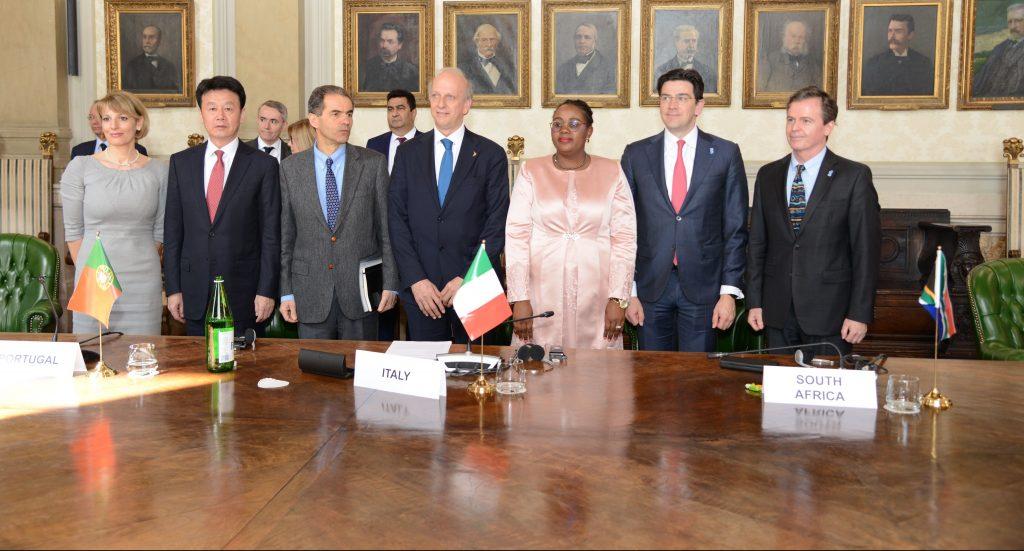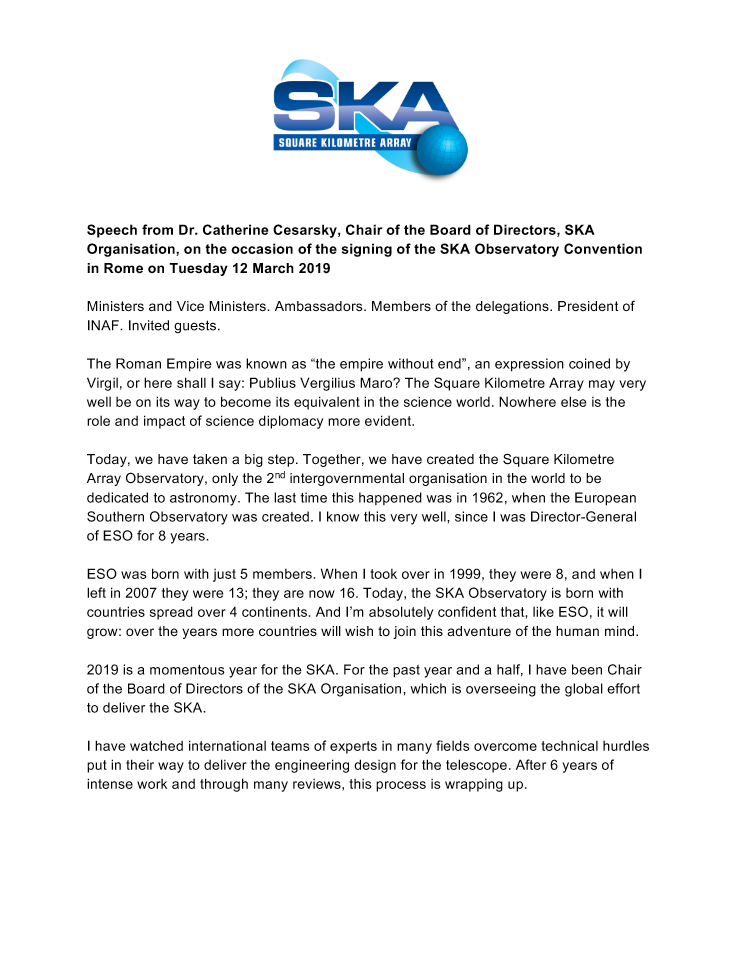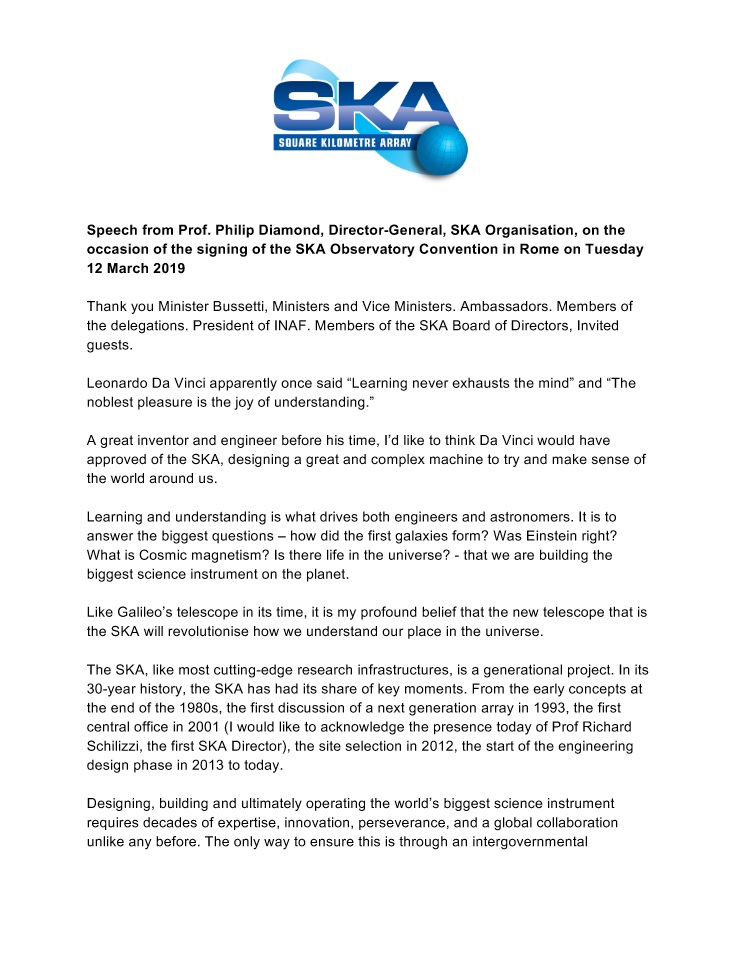Founding Members sign SKA Observatory treaty

Ministers, Ambassadors and other high-level representatives from over 15 countries have gathered in the Italian capital for the signature of the treaty which establishes the Square Kilometre Array Observatory (SKAO), the intergovernmental organisation (IGO) tasked with delivering and operating the SKA.
“Today we are particularly honored to sign, right here at the Ministry of Education, University and Research, the Treaty for the establishment of the SKA Observatory” Italian Minister of Education Marco Bussetti who presided over the event, said. “A signature that comes after a long phase of negotiations, in which our country has played a leading role. The Rome Convention testifies the spirit of collaboration that scientific research triggers between countries and people around the world, because science speaks all the languages of the planet and its language connects the whole world. This Treaty – he added – is the moment that marks our present and our future history, the history of science and knowledge of the Universe. The SKA project is the icon of the increasingly strategic role that scientific research has taken on in contemporary society. Research is the engine of innovation and growth: knowledge translates into individual and collective well-being, both social and economic. Participating in the forefront of such an extensive and important international project is a great opportunity for the Italian scientific community, both for the contribution that our many excellences can give and for sharing the big amount of data that SKA will collect and redistribute”
Seven countries signed the treaty today, including Australia, China, Italy, The Netherlands, Portugal, South Africa and the United Kingdom. India and Sweden, who also took part in the multilateral negotiations to set up the SKA Observatory IGO, are following further internal processes before signing the treaty. Together, these countries will form the founding members of the new organisation.
Dr. Catherine Cesarsky, Chair of the SKA Board of Directors, added “Rome wasn’t built in a day. Likewise, designing, building and operating the world’s biggest telescope takes decades of efforts, expertise, innovation, perseverance, and global collaboration. Today we’ve laid the foundations that will enable us to make the SKA a reality.”
The SKA will be the largest science facility on the planet, with infrastructure spread across three continents on both hemispheres. Its two networks of hundreds of dishes and thousands of antennas will be distributed over hundreds of kilometres in Australia and South Africa, with the Headquarters in the United Kingdom.
Together with facilities like the James Webb Space Telescope, CERN’s Large Hadron Collider, the LIGO gravitational wave detector, the new generation of extremely large optical telescopes and the ITER fusion reactor, the SKA will be one of humanity’s cornerstone physics machines in the 21st century.
Prof. Philip Diamond, Director-General of the SKA Organisation which has led the design of the telescope added: “Like Galileo’s telescope in its time, the SKA will revolutionise how we understand the world around us and our place in it. Today’s historic signature shows a global commitment behind this vision, and opens up the door to generations of ground-breaking discoveries.”
It will help address fundamental gaps in our understanding of the Universe, enabling astronomers from its participating countries to study gravitational waves and test Einstein’s theory of relativity in extreme environments, investigate the nature of the mysterious fast radio bursts, improve our understanding of the evolution of the Universe over billions of years, map hundreds of millions of galaxies and look for signs of life in the Universe.
Two of the world’s fastest supercomputers will be needed to process the unprecedented amounts of data emanating from the telescopes, with some 600 petabytes expected to be stored and distributed worldwide to the science community every year, or the equivalent of over half a million laptops worth of data.
Close to 700 million euros worth of contracts for the construction of the SKA will start to be awarded from late 2020 to companies and providers in the SKA’s member countries, providing a substantial return on investment for those countries. Spinoffs are also expected to emerge from work to design and build the SKA, with start-ups already being created out of some of the design work and impact reaching far beyond astronomy.
Over 1,000 engineers and scientists in 20 countries have been involved in designing the SKA over the past five years, with new research programmes, educational initiatives and collaborations being created in various countries to train the next generation of scientists and engineers.
Guests from Canada, France, Malta, New Zealand, the Republic of Korea, Spain and Switzerland were also in attendance to witness the signature and reaffirmed their strong interest in the project. They all confirmed they are making their best efforts to prepare the conditions for a future decision of participation of their respective country in the SKA Observatory.
The signature concludes three and a half years of negotiations by government representatives and international lawyers, and kicks off the legislative process in the signing countries, which will see SKAO enter into force once five countries including all three hosts have ratified the treaty through their respective legislatures.
SKAO becomes only the second intergovernmental organisation dedicated to astronomy in the world, after the European Southern Observatory (ESO).
(Scroll down for supporting statements)


Supporting statements
The Hon Karen Andrews MP, Minister for Industry, Science and Technology, Australia
“Australia is extremely proud to be part of the SKA Observatory and the incredible astronomy this telescope will achieve. The signing of the Convention is a major milestone for the international science community and Australia looks forward to the decades of scientific and industrial outcomes it will achieve.”
Zhang Jianguo, Vice Minister of Ministry of Science and Technology (MOST) of the People’s Republic of China
“It is a great pleasure for me to have witnessed the official signing of the SKA Observatory Convention today. This is an important and a historic event for both SKA and the global astronomical community. Here, I’d like first to thank Italy, the presidency of the IGO negotiation, for its important contribution and gracious reception. During the three years of negotiation and seven years of preparation for construction, member countries have displayed an open and inclusive attitude for cooperation and sought common development through pragmatic action. With seven member countries officially signing the SKA Observatory Convention today, we believe that more members will join SKA in the near future. We are certainly looking forward to working with all our partners to share the benefits of SKA through consultation and collaboration, contributing Chinese strength for the world’s largest radio telescope to explore the Universe and Chinese wisdom to address the cosmic dawn, the cradle of life and other common concerns of mankind.”
Prof. Nichi D’Amico, President of the Italian National Institute for Astrophysics (INAF)
“It is an honor for INAF to represent Italy in the SKA project. Thanks to this signature, our country is confirmed as a protagonist in the field of astronomy. INAF is actually one of the few research institutes in the world that has the intellectual and instrumental resources to observe the Universe at all wavelengths, from ground and space, covering the whole electromagnetic spectrum. And thanks to INAF’s leadership, the entire Italian scientific community will enjoy a cross-cutting involvement in the SKA project in the years to come”.
Ingrid van Engelshoven, Minister of Education, Culture and Science, The Netherlands
“Cooperation and a strong system are very important for Dutch science policy. That’s why I strongly believe in joining world-class research facilities like the Square Kilometre Array.
The Netherlands is excited to join this global endeavor, having full confidence that the SKA-telescope will be a world-class research facility delivering groundbreaking research in the years to come, providing new answers to questions in astronomy, data science and sustainable energy. Participation in SKA will bring scientific and economic fruits and will enable the Netherlands to strengthen its prominent position in the world of radio-astronomy.”
Ms. Mmamoloko Kubayi-Ngubane, Minister of Science and Technology, South Africa
“South Africa’s signature on the establishment of the SKAO as an intergovernmental legal entity to oversee the construction and operational phases of the SKA project is a crucial milestone and one which should be celebrated. What makes this particularly unique is the fact that for the first time, Africa, Asia, Australasia and Europe, commit at the inter-governmental level to collaborate on a large-scale science project as equal partners. This represents the start of a new era for global science governance. International cooperation in science plays a crucial role in fostering international friendship and solidarity and bolster commitment to multilateralism which will assist our world in addressing global challenges like poverty, inequality and climate change. The signing of the Convention puts science diplomacy into practice. Already South Africa has delivered on the Meerkat, a pathfinder to the SKA, and our government looks forward to the next phase of this global initiative in building a platform for this extraordinary scientific achievement”.
The Rt Hon Greg Clark MP, Secretary of State for Business, Energy and Industrial Strategy, UK
”Science has no borders and the UK’s hosting of the global HQ of this international project demonstrates our leading position and influence in leading scientific collaboration and exploration. For generations, Jodrell Bank has inspired young people and children to take an interest in science and it will now inspire the next generation of scientists. This Government, through our modern Industrial Strategy is giving the biggest boost to research and development funding in UK history to ensure we inspire our young people.”
—-
Dr. Gregory G. Fahlman, Senior Advisor to the Vice-President, Emerging Technologies, Herzberg Astronomy and Astrophysics Research Centre, National Research Council Canada
“On behalf of the Canadian astronomy community I’m very pleased to be here to witness the Treaty signing and express our thanks to the Italian Government for steering the complex negotiations through to this conclusion. The promise of SKA is to produce transformational answers to some of the deepest questions in science and beyond that into the origin of life itself and our place in the universe.”
Dr. Guy Perrin, Deputy Director CNRS-INSU, Head of Astronomy & Astrophysics Division, France
“CNRS/INSU is enthusiastic of the progress made in the design of this very ambitious Observatory project, and gives its best wishes to a successful completion, while working hard with its academic and industrial partners to get France in a position to fully contribute to its success in a timely manner.”
Arun Srivastava, Head Institutional Collaboration and Programs Division, Department of Atomic Energy, India
“India is delighted to have taken part in the multilateral negotiations to establish the SKA Observatory and to witness the signature of the SKA Convention today. As one of the negotiating parties to the treaty, India is now looking very closely at how best and when to join the other founding members following completion of connected policy documents and then complete our internal governmental processes. India’s role in the SKA has been instrumental so far and are looking forward towards the future as we enter construction and operations of the telescope.”
Dr. Saku Tsuneta, Director General, National Astronomical Observatory of Japan
“On behalf of the National Astronomical Observatory of Japan, I would like to congratulate you on the signing of the Square Kilometre Array Observatory treaty. The SKA will be one of the largest radio telescopes leading world astronomy in the future and will have the potential to elucidate the origins of life, stars, galaxies, and ultimately the Universe. The cooperation of countries all over the world to build the telescope and promote science research makes this a project that will remain forever in the history of human beings. The formal establishment of the Observatory will drive the progress of science and engineering and will support the development of the younger generation. Such an occasion calls for celebration. I also express deep respect for all of the stakeholders whose contributions helped to make this project possible.”
The Hon Evarist Bartolo MP, Minister for Education and Employment, Malta
“Malta is honoured to have played a role in what is undoubtedly a historic moment for Astronomy. The Square Kilometre Array promises to be an instrument capable of probing the deepest mysteries of the universe, whilst bringing together scientists from many different cultures. The formation of this Inter-Governmental Organisation highlights the importance of collaboration between different countries to develop the world’s leading technology and scientific programmes.”
Dr. Hyung Mok Lee, President, Korea Astronomy and Space Science Institute
“I’d like to heartily congratulate the signing parties of the SKAO convention on their agreement after the intensive negotiations during the last three years. Today’s signing ceremony is a very historic moment for the astronomical community in the world. SKAO, as an intergovernmental organization, sets a real model for the international collaboration among nations regardless of regime and ideology. I am convinced that this will encourage more challenges in the true sense of international collaboration. As a favorable observer in the SKA project to build the world’s largest radio telescope through international cooperation, KASI is endeavoring to seek ways to join this opportunity of new observational infrastructure following ALMA and GMT for Korea.”
Inmaculada Figueroa, Deputy Vice-Director General of Internationalisation of Science & Innovation, Ministry of Science, Innovation and Universities, Spain
“The Square Kilometre Array (SKA), the largest radio telescope on earth, will place humanity at the frontiers of knowledge of the Universe, taking us to a new era of revolutionary discoveries that will undoubtedly revolutionize many fields of astronomy and physics. To do so, the SKA will promote knowledge and innovation in key technology areas such as Big Data and High Performance Computing, among many others. On this important occasion of the signing ceremony of the the SKA International Convention, to which Spain has been kindly invited to participate, we would like to congratulate our partners, especially the signatory countries. We are proud to be part of the SKA family, and we expect to have the opportunity to join the Convention in the near future, facilitating the participation of the Spanish community of astronomers and technologists in the construction of the SKA: one of the greatest scientific adventures in the world in the coming decades.”
Her Excellency Ms. Rita Adam, Ambassador of Switzerland in Italy
“Today seven countries from different continents joined their forces to provide solid legal foundations to what may become one of the most important scientific global endeavor of the XXIst century. The Square Kilometre Array follows at the global level in the illustrious European footsteps of ESA, ESO and of course also CERN, the international research organization that paved the way to many others and enabled breakthrough discoveries and major societal changes through disruptive technologies all the way since its establishment in 1954. As the proud statutory seat of CERN, Switzerland congratulates all the parties that made it possible for the Square Kilometre Array to reach the signature step and looks forward to strengthening its relationship with this brand new international research organization. May the Square Kilometre Array contribute to stimulate the curiosity of scientists worldwide and ultimately let the humanity better understand the universe it lives in.”
Dr. Tony Beasley, Director, National Radio Astronomy Observatory, USA
“NRAO shares the SKA’s vision that 21st century science requires new technologies and capabilities. The grand challenges in astronomy and astrophysics can only be answered by the next generation of radio astronomy facilities, and we congratulate all parties on this signing ceremony for their commitment to fundamental research. Beyond the scientific and technical breakthroughs, the societal and broader benefits of the SKA will excite and inspire new generations of STEM students and professionals.”
Dr. Xavier Barcons, Director General, European Southern Observatory
“This is an important day for astronomy where we celebrate the launch of an organisation devoted to fundamental science and advancing knowledge for the benefit of all humanity. The longstanding commitment of Member and Host State governments allowed ESO to develop into a world-leading multi-observatory organisation over the past 55 years and stands as testament to the scientific, industrial and cultural importance of astronomy. The signature of the international SKA convention represents the start of a similar commitment and the beginning of a new journey for astronomy that will realise many important scientific discoveries. On behalf of the ESO community, I look forward to the rich opportunities for astronomers to use ESO facilities and SKA in the future to further our knowledge of the Universe.”
Prof. Ewine van Dishoeck, President, International Astronomical Union
“On behalf of the International Astronomical Union, I congratulate the SKA Observatory on the signing of the international SKA Convention. The IAU strongly supports and promotes global cooperation and collaboration on large facilities, needed to realize increasingly ambitious astronomical projects like the SKA. Astronomers worldwide look forward to the new scientific opportunities that the SKA will bring to unravel the mysteries of the Universe. The SKA will also drive innovative solutions to big data challenges, important to society at large.”
About the IGO
- The objective is to form a long-term, stable organisation that can build and operate the SKA internationally over 50+ years.
- The SKA Observatory is established by treaty negotiated by authorised state representatives, and composed of sovereign states as members.
- It involved a multilateral treaty negotiation over three and a half years.
- The SKA Observatory will enter into force once the treaty is ratified by five countries including all three hosts.
- The SKA Observatory joins the European Southern Observatory (ESO) as the only two IGOs in the world dedicated to astronomy.
- Negotiations were hosted by the Italian Government in Rome through the National Institute for Astrophysics (INAF).




